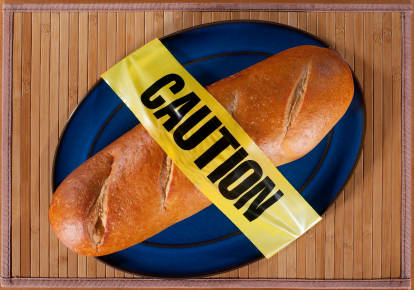Lose Weight > Common Sense To Lose Weight > Common Sense Article > 13 Losing Weight Tips And Diet Myths
13 Losing Weight Tips And Diet Myths
In fact, there are a lucky thirteen points that cover the latest thinking... a must-read list if you're planning on making changes to your health during the New Year. Some of the things that made the list are out of your control... but many more are not.
1. Genetics: Science now thinks that there are lots of different fat genes... maybe as many as 100. Those with the gene linked to fat were 40% more likely to have diabetes, and 60% more likely to be obese. Exercising regularly is believed to offset the risk.
2. Fat Cell Counts: The range of this type of cells in the body is huge, with some people having two times as many fat cells as others. Fat cell count doesn't change inside the body. So while you can't reduce the overall number you have, you can do things to keep them from getting any bigger.
3. Metabolism: Scandinavian researchers have found in twin studies where one twin was obese and the other thin, that metabolic changes made it harder to burn fat in the heavier twin. A weight gain of 11 pounds can slow your metabolism and doom you to a vicious cycle... as you gain more fat it becomes harder to loose. Avoid this by staying active.
4. Stress Levels: Science knows that carb rich foods tend to calm stress hormones -- which is why we crave them. Eating as a coping mechanism is well known, but research has shown that stress hormones also ramp up fat storage. To fight the effect, make a commitment to stress management as part of your daily routine.
5. Prenatal Environment: A growing body of research suggests that sugary and fatty foods, eaten before you're born, can case trouble for the body of the developing baby. Yet another reason why eating well while you're pregnant is so very important.
6. Sleep: If you're getting less than seven to eight hours of sleep per night, you might need more sleep to keep your weight loss efforts on track. Sleep deprivation upsets our hormone balance and this triggers a decrease in leptin (the one that helps you feel full) and increase in ghrelin (the one that triggers hunger) so you think you're hungry even when you're not. Getting enough sleep might be the simplest, most natural weight loss secret out there.
7. Your Spouse: Research shows that weight gain, or loss, can be contagious. A study in the New England Journal of Medicine suggests that if one spouse is obese, the other is 37% more likely to be obese as well.
8. Viruses: The link between a virus and fat was uncovered when researchers from the University of Wisconsin injected viruses into chickens and found that they gained weight. Stem cells also turned into fat cells when injected this way. Human studies using twins, found that obese people were more likely to have antibodies for a virus known as adenovirus-36.
9. Addictive Tendencies: While food might not be addictive in the way alcohol and drugs are, there are uncanny similarities according to scientists. Dopamine, a hormone linked to motivation and pleasure might have something to do with it. One theory suggests that obese people might not have the same number of dopamine receptors, so they have to eat more to feel good.
10. Taste Buds: Researchers at the University of Florida wondered why people who tasted food less intensely seemed more likely to be overweight. Science also knows that ear infections can do damage a taste nerve that runs through the middle ear, what's more these patients are more likely to love sweets and fatty foods, perhaps due to the damaged nerve that can't sense sweetness or fattiness properly. You can try to limit the number of childhood ear infections by protecting young children from passive smoke; adults can pay more active attention to the texture and taste of the food you're eating.
11. Antioxidants: Free radicals get the blame for making you look fat and old, and science has found that these oxidizing molecules hurt the cells that tell us we're full. Free radicals are especially available when we gorge on candy, chips and other carbs. Your best bet is to limit or avoid the junk and load up on the antioxidant rich fruits and veggies your body needs.
12. Your Diet: The low fat gurus now say that some fats are okay, and low carb adherents are starting to sign on to whole grains, In fact, you may have noticed that more of the diet plans seem to be saying the same thing. Eat carbs in the form of whole grains and fiber; avoid trans and saturated fats, eat lean protein, fill up on fruits and veggies. Moderation is the key.
13. Redefining Fitness: A growing body of evidence suggests that size doesn't matter so much when it comes to being healthy. Research appearing in the Archives of Internal Medicine found that overweight people had nearly normal measures of good health, while those who were trim had metabolic abnormalities that made them more vulnerable to some diseases.
Never before has the average person had access to so much information about weight and the risks it brings to the body.
The good news is that while there are some factors, like genetics and prenatal environment that we can't change, there are many more losing weight tips that we can use to good effect -- that really have an impact on keeping us healthy, now and for years to come.
Related Articles
-
Getting On A Healthy Weight Loss Diet
Getting on a healthy weight loss diet is one of the most important pr
-
Aerobics Imposters
In health clubs, they run classes that call themselves aerobics. As yo
-
11 Ways to Reduce Body Fat: From Health Experts
Just the right amount of
-
Get Slender Legs The Effortless Way – 2 Tips For Skinny Thighs
Get Slim legs the simple and easy way…sounds good doesn’t
-
Heart Disease a Risk Factor for Prostate Cancer
Coronary heart disease is the leading cause of death in the Uni
-
The Dangers of Your Excess Abdominal Fats Its More Serious Than You Beleive Read Here Find Out More
Did you know that the vast majority of p
- DON'T MISS
- Transform Your Yoga Practice (And Your Body!) With Sprints
- Enjoy The Benefits From Weight Loss!
- 7 Lifestyle Changes That Helped Me Lose 80 Pounds
- Get Your Best Beach Body with 50 Ways to Burn 50 Calories This Summer
- Do I Need to Lose Weight?
- The Healthy Way to Lose Belly Fat
- Basic Need To Lose Weight
- Top Five Reasons You Should NOT Go On A Diet This New Year
- Food Lovers - How to Master Weight Loss
- Understand the Smoking-Diabetes Link




